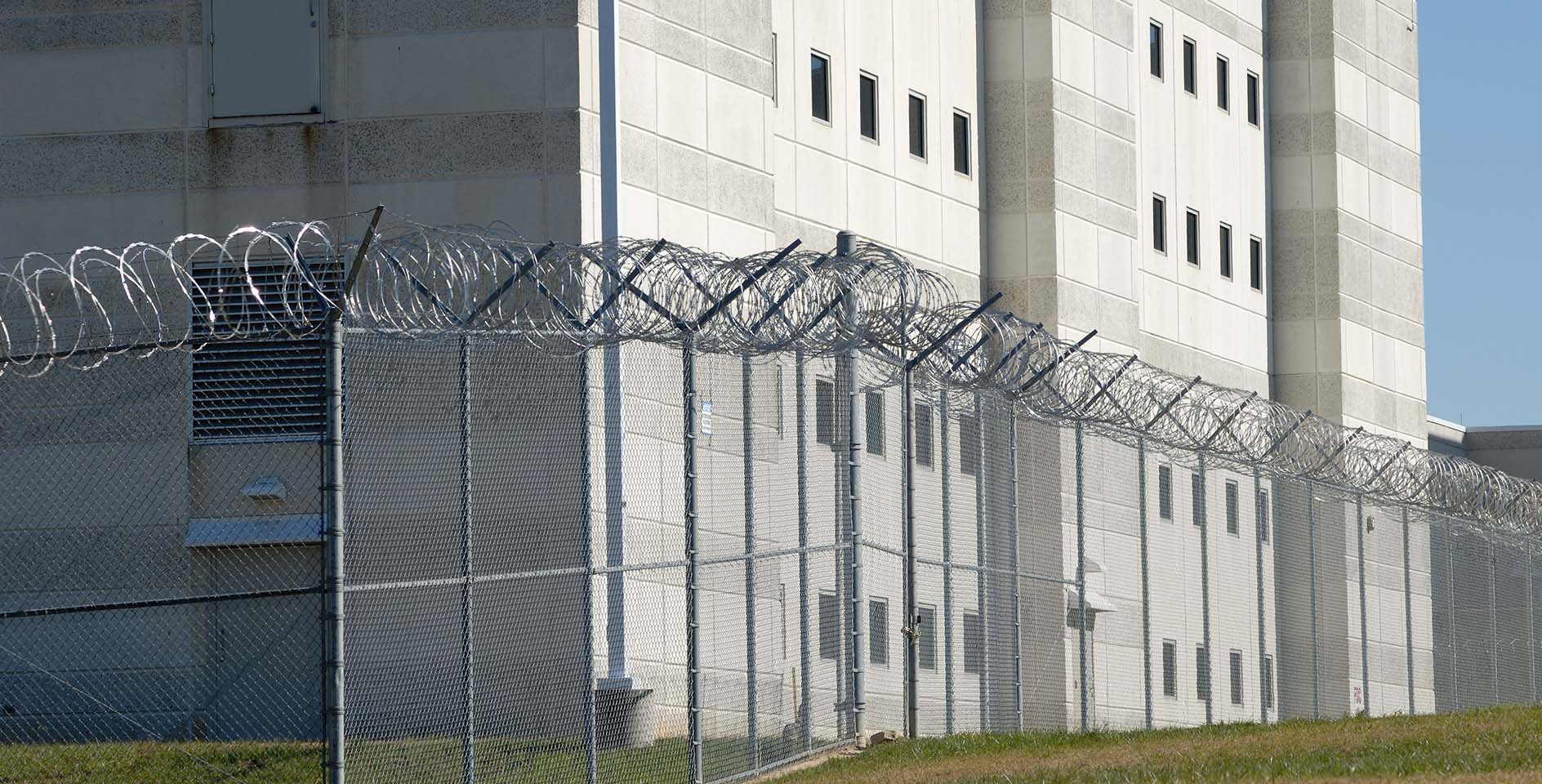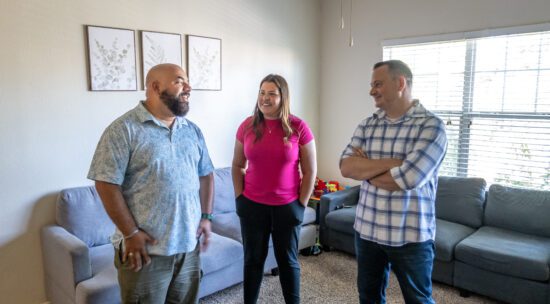One of the amazing truths about the gospel of Jesus Christ is that it is not bound by anyone or anything. There is no person, no sin, no location, no background, and no circumstance that can hinder the reach of the gospel through the power of the Holy Spirit. And one of the places this is most powerfully seen is inside the walls of a prison. A prison can be a place of darkness, violence, and despair. Men and women have forfeited their freedom – for a season or for life – and have to face the consequences of their choices. That’s where places like New Orleans Baptist Theological Seminary come in, with a desire to serve those who are so often forgotten. Jody Dean, associate professor of Christian Education and senior regional associate dean for Extension Centers, discusses the prison ministry at NOBTS, the importance of theological education, and what the church can learn from our brothers and sisters who are a part of this program.
Lindsay: Tell us a little bit about the prison ministry you do through New Orleans Baptist Theological Seminary and your undergraduate college at Louisiana State Penitentiary and other prisons.
Jody Dean: Angola (Louisiana State Penitentiary) was known as a horrible prison for violence among the prison system throughout the nation. The warden, through our former president at the time, was able to work out a partnership for us to offer theological education inside the prison. So, through the undergraduate program, we were able to offer the associate’s and undergraduate bachelor’s degrees, which allows prisoners to earn a Christian ministry degree, and makes them able to minister inside that prison. Because of this, we have seen a direct correlation between our programs in the prison and a decrease in many aspects of prison culture, such as gang activity and violence. The radical transformation of the gospel of Jesus Christ was changing the prison culture. It began with that radical transformation, which then led to people wanting to be equipped for ministry, and even plant churches inside of the prison. Overall, it is great to see that the prison was seeing the improvements they wanted to.
From the results of that, we have seen other states want to do a similar kind of work, and some have done it with us. Our bandwidth has allowed us to reach out to a women’s prison here in Louisiana, a program in central Mississippi, a program in Georgia, and a program in Florida. In fact, another school took on one of the programs we had in Georgia. Some of our sister seminaries and Baptist colleges have also started doing this work in other parts of our nation, too.
We are just so thankful to see the growth of prison programs as people have received the gospel and want to minister as field ministers and plant churches. It’s been great to see what God has done over several decades of being able to do this work.
LN: What is a field minister?
JD: A field minister is someone who is able to do what I am not able to do. That is, they are able to have an ongoing relationship with somebody else within the prison. They are able to teach and preach the Bible, and to be alongside their neighbors in their community. Essentially, they’re able to do everything that I’m able to do in the local church. For the most part, they’re able to offer pastoral care, discipleship, and even accountability. While there may be limitations in some settings of what the field ministers are able to do, they are the front-line ministers in the prison community, alongside chaplains.
LN: How does Scripture inform NOBTS’s ministry to prisoners? And with that foundation, what keeps you persevering when the road gets tough?
JD: The Great Commission has always been a driving force of New Orleans Baptist Theological Seminary. It was planted by Southern Baptists in New Orleans to equip missionaries for the gospel and to go into the hard-to-reach places. Our president, Dr. Jamie Dew, says “prepare here, serve anywhere,” and that applies to a prison context. It’s not necessarily the serve anywhere context you think you might land at, but it does allow us to prepare servants to walk with Christ, proclaim his truth, and fulfill his mission.
We have the Great Commission from Matthew on our seal, and when you see that seal on your diploma, you know that you’re part of that Great Commission to go teach people about Jesus and share the gospel. We have pictures of people being baptized inside prison and have seen evidence of the gospel just transforming people’s lives. Scripture is the foundation to everything that we do, and Jesus’ ministry showed us how to be the hands and feet of Jesus to all people, wherever they may be. We have tried to be that as well in theological education, to equip people, and call them to ministry wherever they may be.
LN: When you are engaged in this ministry, what does that look like?
Jd: It is primarily people going inside and teaching in person, especially with the limited internet access that the inmates have with people on the outside of the prison walls. Some of those are in a workshop. Most of those are weekly and ongoing, like a normal semester environment with weekly instruction. Sometimes it’s our trustee-elected faculty and sometimes it’s adjuncts and ministers that live in proximity to be able to drive in. But we have the same qualifications to teach as is needed for an accredited degree.
We have a great group of people that help make the program happen in those contexts to teach the classes, pour into the students, grade their work, and mentor them in their classes. We teach English and statistics, as well as church planting, counseling, and other courses on discipleship.
LN: How have you seen the prison ministry help to change the prison culture through redemption and restoration?
JD: In Angloa, we saw all the metrics reduce, as far as violence, gang activity, and all the other things that we wanted to see improve inside of prison. The radical transformation of the gospel, as we know, impacts all of our lives, whether we’re incarcerated or not. People accept Christ. We’ve also seen these guys that want to be equipped to minister inside the prison since you can’t leave to go to church. We started seeing churches planted inside the prison and the gospel move throughout the prison. We saw all the men just continuing to minister and reach out. They allowed them to be field ministers as graduates of the program inside Angola, and then they will also sometimes be transferred to other prisons to be able to do ministry too.
This ministry causes them to be mobilized — to be sent out as a field minister, sometimes into an unknown location or into an unknown section of the prison. This is like moving to a whole new community. With that comes all the ministry challenges: building relationships and living out your faith, even when it’s not convenient. The radical transformation of people now walking with Christ and wanting to proclaim his truth to other people has been amazing to see throughout the prison systems that offer theological training throughout the nation.
LN: What is the role of education in helping these prisoners feel a sense of dignity?
JD: It’s so important for them to be reminded that Jesus knows exactly where they are and still cares for them. I truly believe in Jeremiah 29:11, as far as having a plan for our lives, but I think the students at Angola and these other locations could help us really understand Jeremiah 29:13 which says, “You will seek me and know me when you seek me with all of your heart.”
What amazes me is when I’m able to go and be there for a milestone or a graduation celebration. You get to be there with their family and celebrate with them and you’re reminded that these men and women have sought the Lord through circumstances that radically changed their lives. And though their life was radically changed, to put them in the context that they’re in, the Lord has done something wonderful in that and they have found a relationship with him and a call to ministry. They’re reaching hundreds for Christ, and the churches are growing as the local congregations are planted and they’re ministering to people each and every day.
They still have struggles, of course, like all of us that have accepted Christ, but they have been able to find peace on the journey and are now able to help other people. That has been so encouraging to see with this program — it has helped drive them to find purpose in ministering to one another. I really think that’s why Angola saw many metrics change, that caused it to go from a violent location to be considerably less violent.
Lindsay: What are some misconceptions about ministering in prisons?
Jody: I think sometimes a misconception is how people measure effectiveness, because it’s not something we see daily. Sometimes I have heard people ask, “How effective is it?” because not everybody sees all the field ministers who have gone out over the years, all the work that has been accomplished with the churches planted, and all the people reached. But it’s an effective work that is making a kingdom impact — it’s changing the face of eternity by way of reaching people and making disciples.
Another misconception is that theological education is not needed in prison. There’s a lot of trade education in prisons, but theological education is needed just as much as every other form of education in a community is needed. They need ministers that can reach and make disciples. So, there is a need for churches and there is a need for equipping students for all areas of ministry as they serve in their context.
LN: What advice would you give to churches and believers who want to get involved with or start a prison ministry?
JD: It’s going to take time, and that’s the most expensive resource. It takes talents, so you’ve got to have the diversity of giftedness to pull it off. But really, it’s also going to take money. It’s expensive, and it can’t just be a quick ministry. It’s going to have to be ongoing and continual. You want to make sure that you, as a church, are ready to come alongside prisons, really engage and support those you serve, and that it’s an ongoing part of your funding to be able to provide needs. You may discover that prisoners need gloves for cold weather, or notebooks, or textbooks, or even Bibles. There are a variety of needs you will discover, and you will want to be able to provide these resources. And that’s going to come at a cost.
So, I would tell churches to weigh the time, to weigh the giftedness, and to weigh the financial components, because it will tug at your heart. There will also be some days that you’re tired and weary, but it is a fulfilling work that makes a great kingdom impact.
LN: How does being a Southern Baptist entity help further this ministry?
JD: I think it is so important that we’re able to provide the education preparation for ministry in churches. The churches are able to partner and come alongside us by encouraging, by providing resources, by providing love, and by providing compassion. All the prison programs have local churches that also support them. I’ve seen local churches provide a meal at a graduation, care packages as a semester starts, and money to help the program exist. I’ve even seen state conventions and local associations come alongside and buy textbooks, aid in planting the churches, and provide all kinds of needs as discovered.
It is a collective work of Southern Baptists. As we all collaborate on this, along with the state conventions and NAMB, it is important because we are able to have chaplains, theological education, churches being planted, and churches partnering with churches on the inside. This work is a ministry of encouragement to the programs and the people that are a part of these programs.
LN: What can we learn from these men and women who are in physical chains but are seeing the Lord set them free?
A lesson I have learned from these prisoners is their unwavering commitment, no matter where they’re located and no matter what environment they find themselves in. They have an unwavering commitment to the Lord. That is the lesson: for each of us to strive to live for him each day. And the students continue to teach me that.
LN: Are there any ways that we, as churches, can be praying for this ministry?
JD: Continue to pray for the students. Pray for the teachers, faculty, staff, and administrators. Pray that the Lord continues to provide the finances needed and that the Lord continues to sustain us in all the ways in which we do this.










